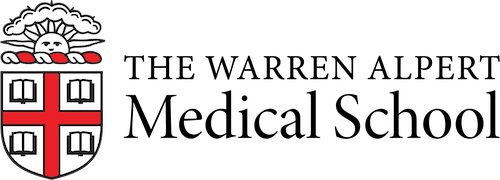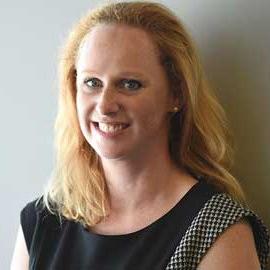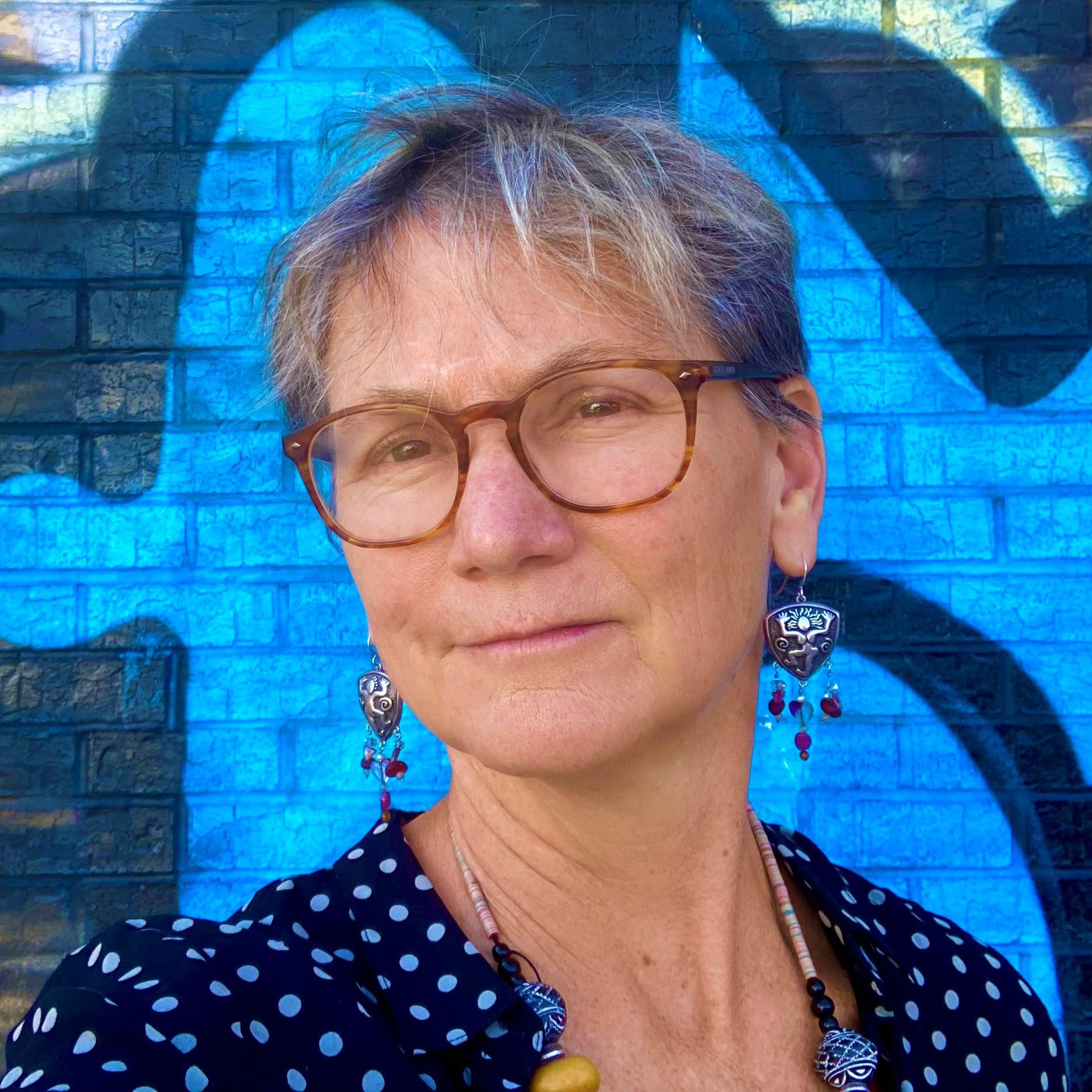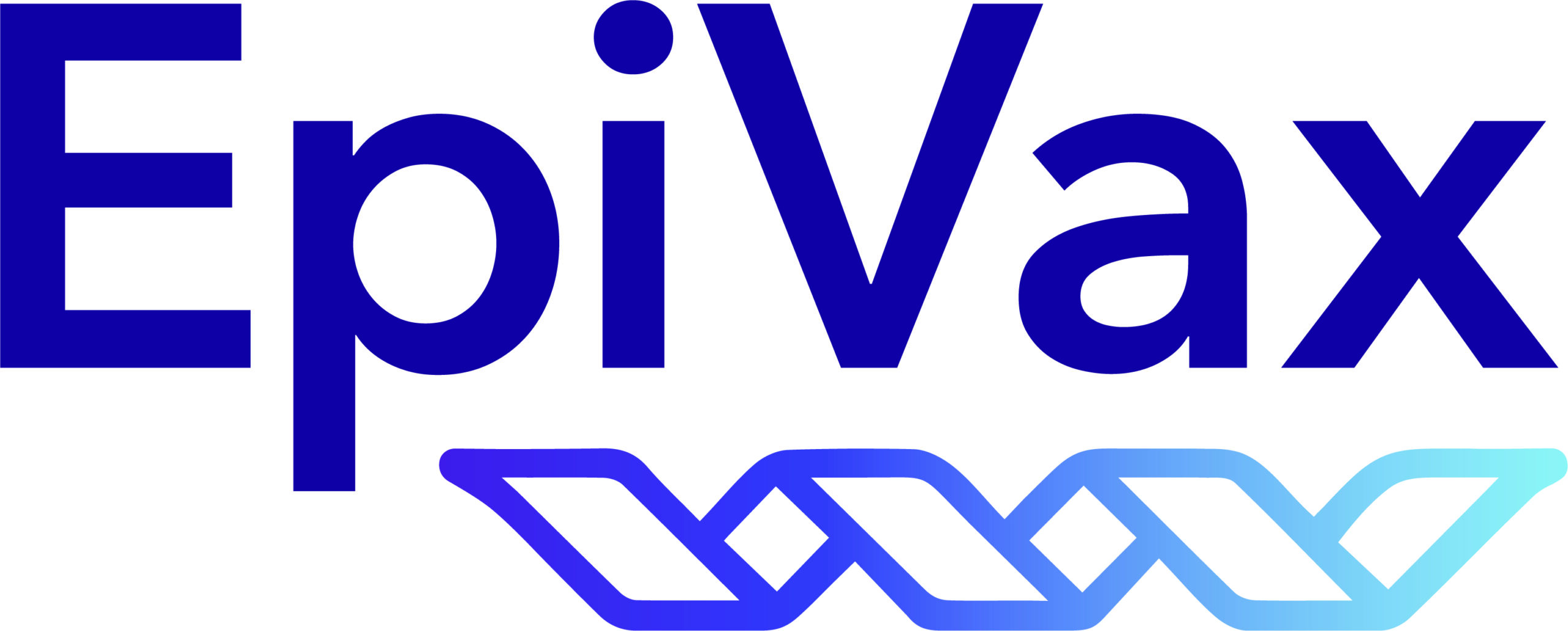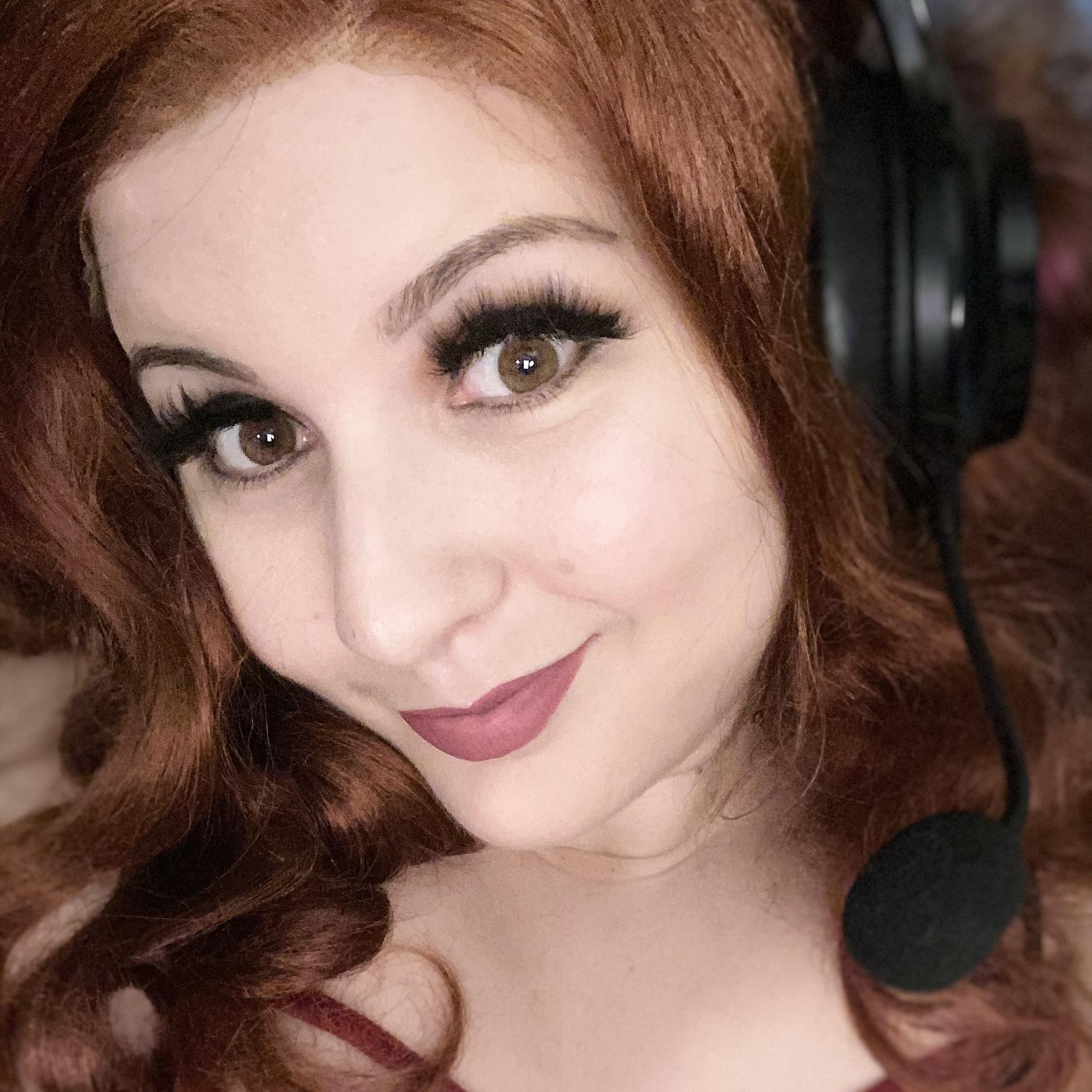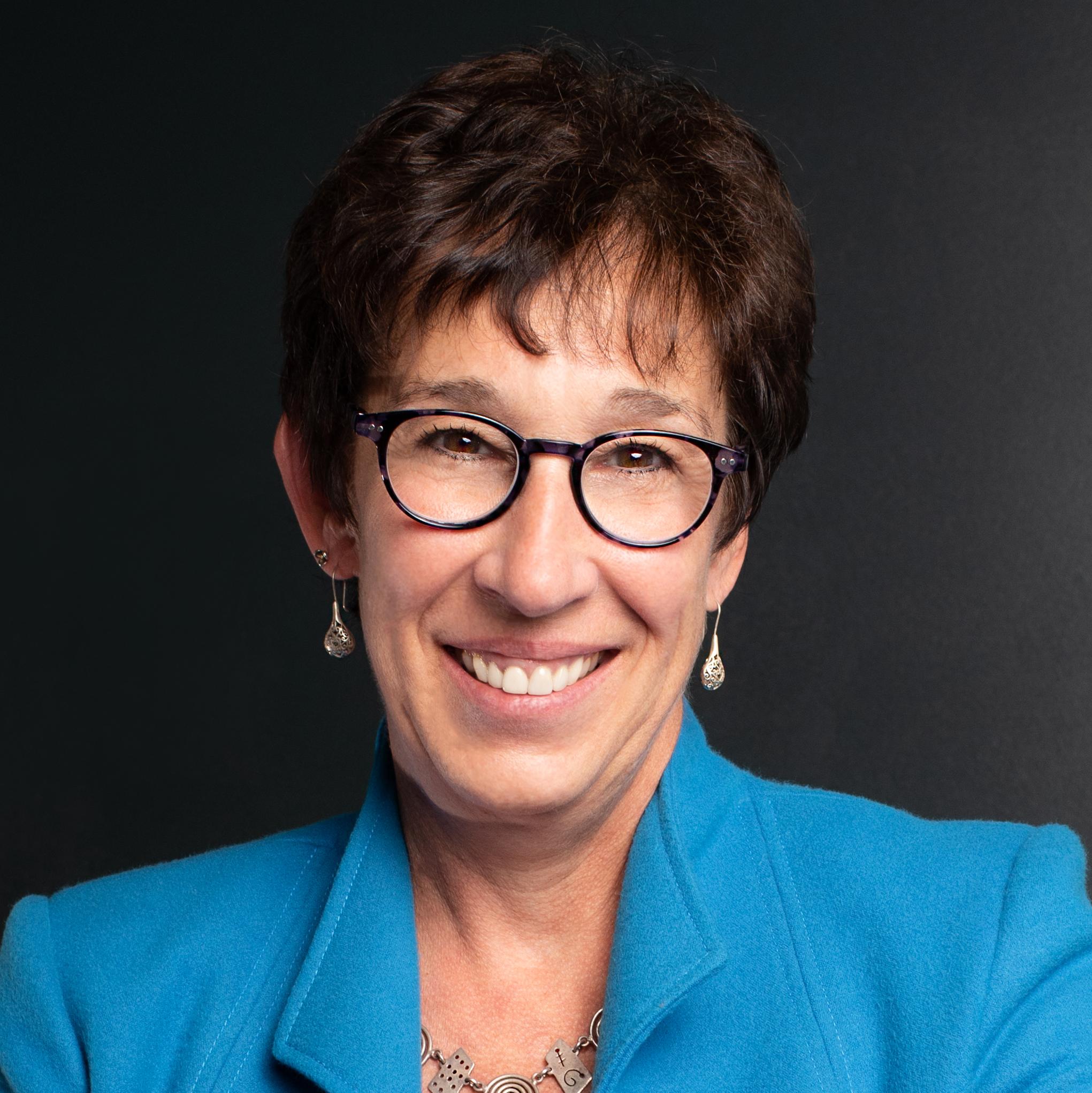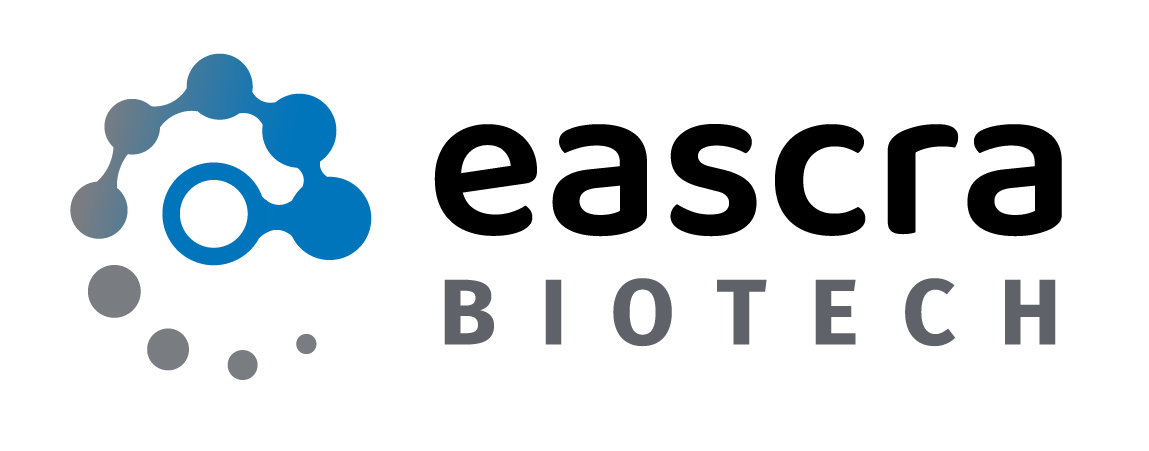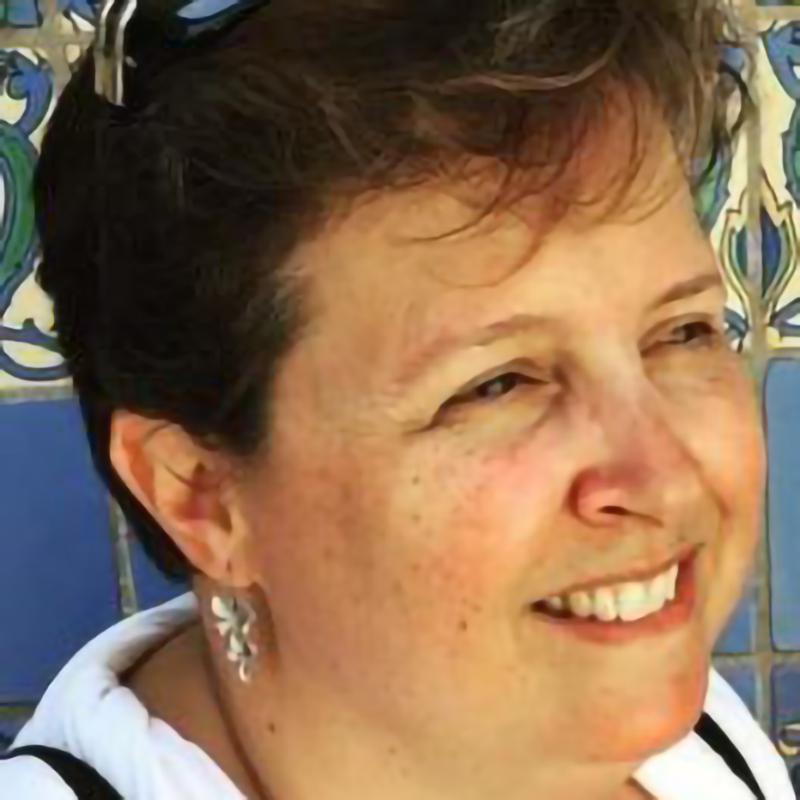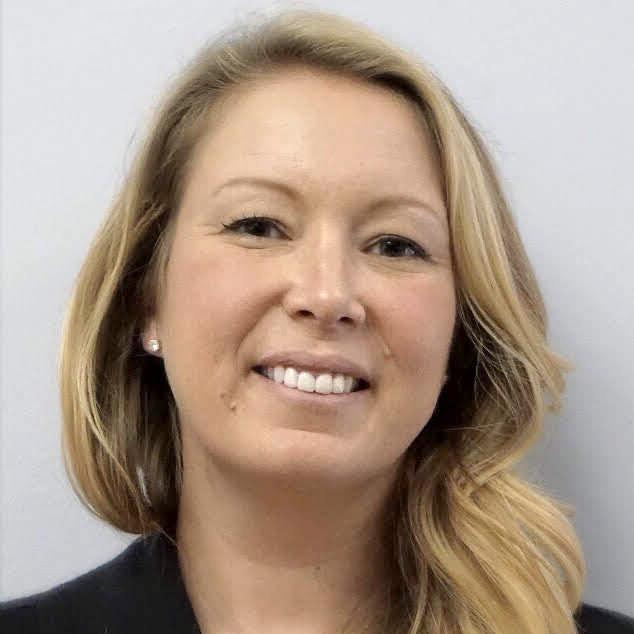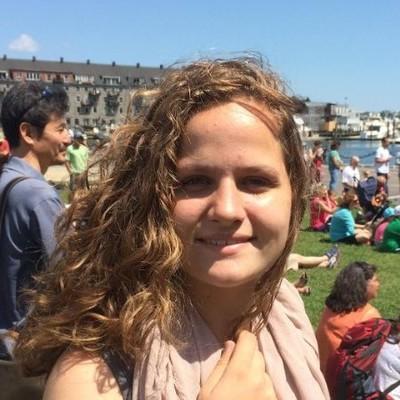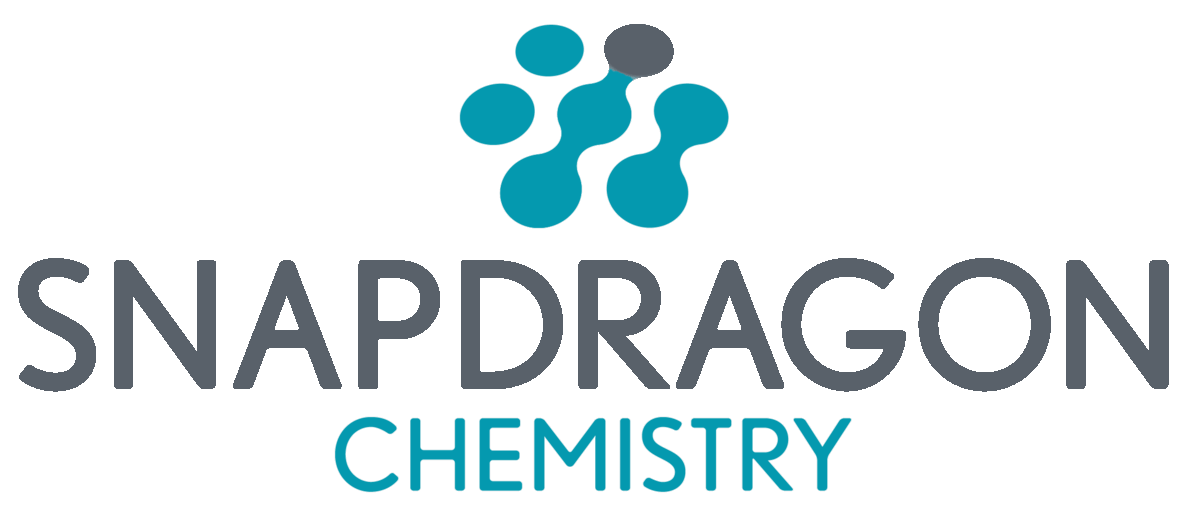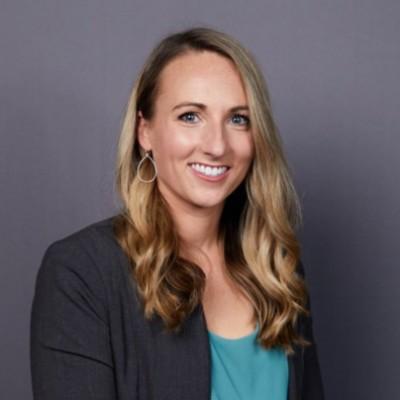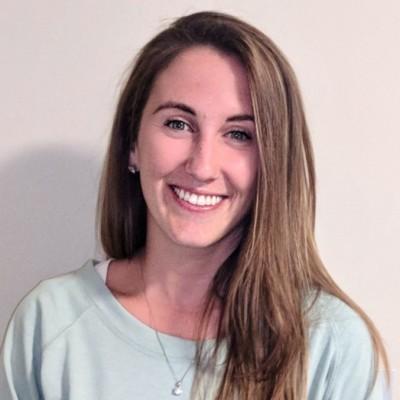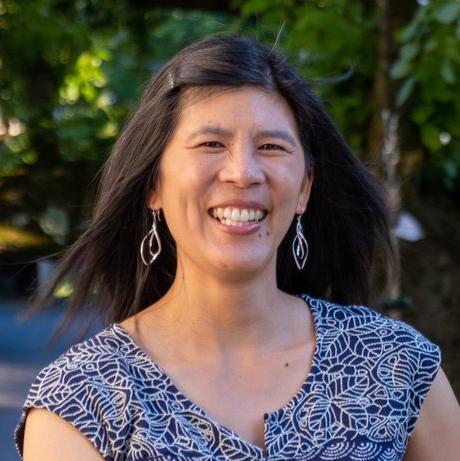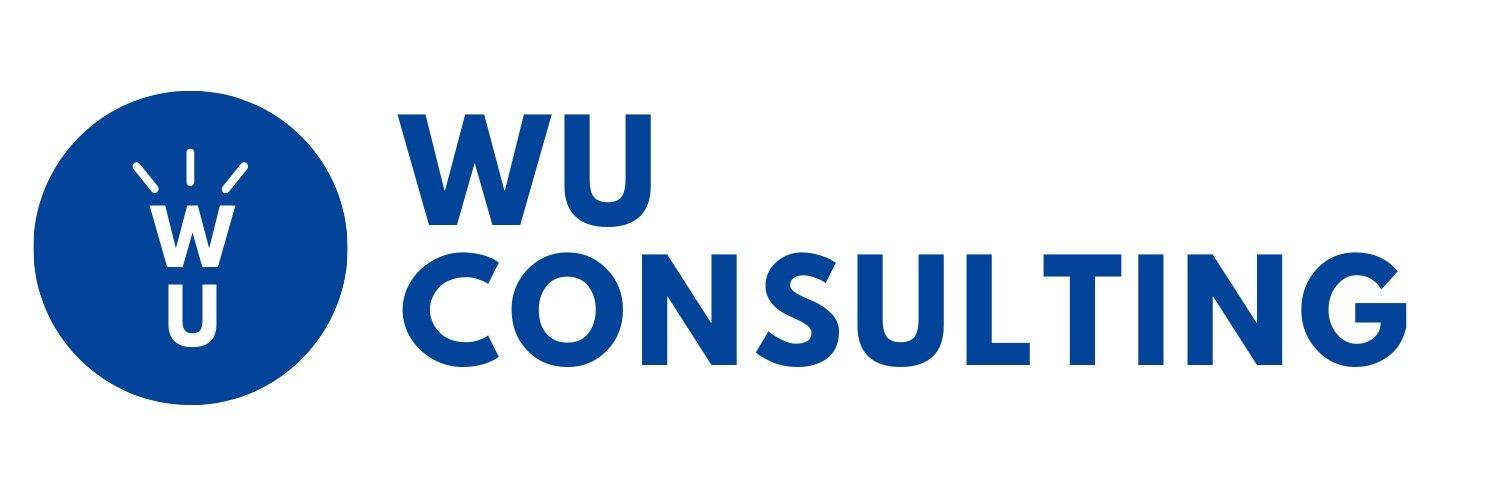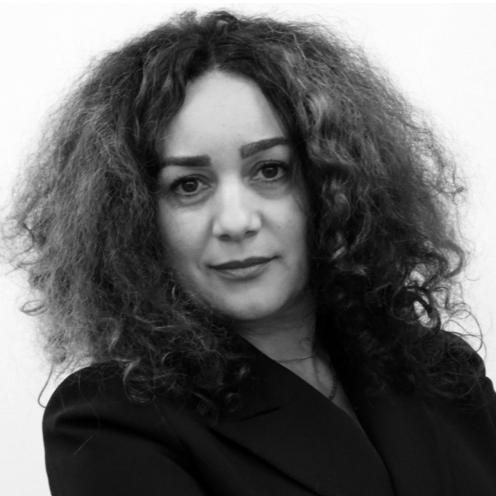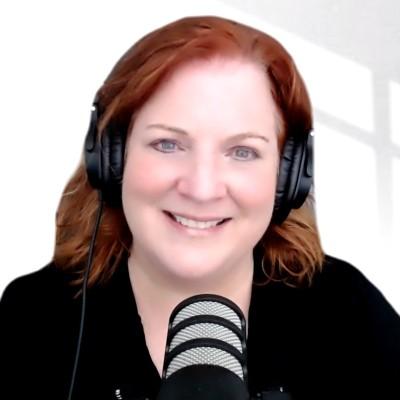Get to know RI Bio Women In Science.
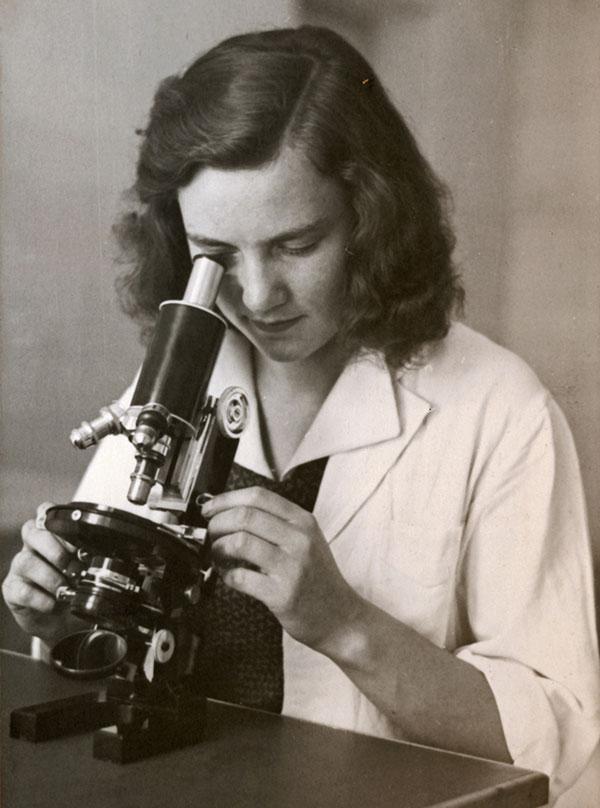
From Marie Curie–the first woman to win a Nobel Prize in 1903–through today, Women in Science have long had a profound impact in their fields, many working in obscurity. We’re inspired by their stories, their insights, and their breakthroughs. As we work to increase women’s representation in the life sciences, we’re casting a light on our members’ contributions and highlighting their inspiring stories on this page. Bookmark this page and visit often as we’ll continually add new stories.
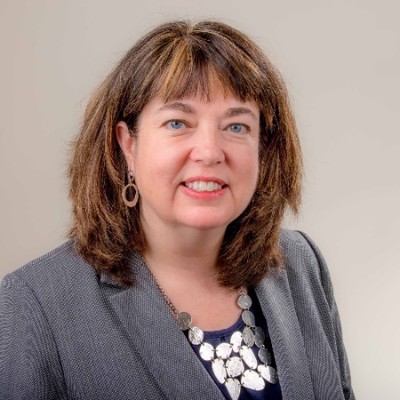
Katherine M. Sharkey, MD, PhD
Associate Professor, Associate Dean for Gender Equity, Warren Alpert Medical School
Researching sleep, mood regulation & women’s health
Q. What are you working on now?
A. “I am a physician-scientist and my work focuses on how sleep difficulties and circadian rhythm dysregulation contribute to the development of psychiatric illness. Right now, I am leading a randomized controlled trial testing an intervention that uses a personalized sleep schedule and bright light therapy to treat depression in perinatal women. This is innovative because pregnant women weren’t even allowed to participate in clinical trials until 1993, and because insufficient and disturbed sleep is assumed to be a foregone conclusion in expectant and new mothers. So, the study really challenges accepted notions about perinatal depression, which is the most common complication of pregnancy and childbirth. In addition to treating depressed mood, the study also has some novel ‘side quests,’ like investigating the relationship between mothers’ and infants’ sleep and examining how perinatal sleep disturbances affect breastfeeding and lactation.”
Q. What has been your biggest professional challenge & how did you overcome it?
A. “I’ve faced so many challenges – not getting into medical school the first time that I applied; having so many grant applications rejected; being told by supervisors that I would never achieve specific goals; running my first large clinical trial during the COVID pandemic; trying to balance different work responsibilities. What I’ve learned is that I need to anticipate that there are always going to be obstacles. So, part of this job is to notice when something isn’t working and then to figure out an alternative strategy to accomplish your goals. And the hard part of this is that you really have to be honest with yourself and also give yourself a little grace. It feels bad to fail, but ultimately the way to overcome challenges is to work the problem and keep going.”
What advice would you give a young woman just entering the field?
A: “Don’t. Give. Up. Aspiring scientists must find collaborators and mentors who are supportive. The scientific workforce needs you and your ideas. Also, being a scientist means that you get to think of hypotheses and then devise ways to test them while working with a variety of cool people – that part is so much fun, so the final piece of advice is to make sure to have fun!”
Q. What are you working on now that is intriguing/exciting/innovative?
A. I am really excited about a National Science Foundation proposal I am writing with my colleagues at JWU, Drs. Nicole Urban and Aimee Dufresne. This grant would allow us to give merit and need-based scholarships to incoming Biology majors and support programming aimed at fostering students’ senses of scientific identity and belonging, scientific communication skills, and professional development. With the cost of secondary education increasing, these scholarships would be life-changing for our STEM students; it would allow them to focus on their studies and extra-curricular opportunities that are so important for their career rather than working quite so much to finance their educations. We also hope that it will help a more diverse population get a seat at the lab bench.
Q. Why did you decide to go into science?
A. As a young kid growing up in rural Kentucky, I very much liked playing in the creek near my house—collecting crawdads, digging in the mud, and putting water samples under my Sears-Roebuck microscope. My 5th grade teacher noticed my interests and encouraged me to take extra kids’ science classes at the local university. That year, I had three entries in the school science fair, winning first and third place.
What has been your biggest professional challenge & how did you overcome it?
A. Honestly, the biggest professional challenge for me has been childcare and balancing the time demands in research. Prior to having children, I worked a lot as did many of my colleagues; it was just assumed one would be in the lab 50-60 hours a week. Fruit flies and tissue culture, after all, do not care about your personal lives. However, after having my first child, I knew that living in the lab was not going to be consistent with what I hoped for myself as a mother. Further complicating matters was that daycare was near impossible to get in Seattle where we lived at the time, and we did not have family in the area. In order to balance child-rearing and work, my husband and I both had to have honest conversations with each other and our bosses. We set up schedules for our projects, hired a lot of good babysitters, and sometimes had to be OK with our career growths taking turns and altering courses.
“We hope to help a more diverse population get a seat at the lab bench.”

Nicole H. Urban, PhD
Associate Professor
Department of Biological and Physical Sciences, John Hazen White College of Arts & Sciences
Affiliated Faculty, College of Engineering & Design, Johnson & Wales University
Q. What are you working on now that is intriguing/exciting/innovative?
A. I thrive on creating a research atmosphere where students from different disciplines collectively tackle complex problems while cross-training in the skillsets of other team members. I established my research lab, the Urban Bioinnovation Lab, with seed funding from the JWU Provost’s Innovation Fund. I have subsequently received generous external finding from the Rhode Island IDeA Network for Biomedical Research Excellence (RI-INBRE) which supports the continued development of our affordable, touch-based, assistive communication and neurologic therapy devices. Our assistive communication devices are designed to support individuals experiencing communication challenges including individuals with autism spectrum disorder or social anxiety, people that are hard of hearing, or English language learners. We are also developing a neurologic therapy device to support a variety of cognitive and post-surgical assessments and therapies. My team brings together students from JWU’s biology, biomedical engineering, and design programs to develop affordable and accessible assistive and therapeutic devices. We have presented it at two national conventions and will continue development in the spring semester.
Q. What was your career journey like?
A. My undergraduate and master’s degrees in biomedical and mechanical engineering set me up perfectly to design medical devices, however I have had a passion for teaching since childhood. So, after a season as an adjunct faculty member I pursued a PhD in Biomedical Sciences and focused on cell signaling cascades and confocal microscopy. My first postdoctoral experience combined all of my research interests, and I was able to work on a variety of biochemistry and orthopedic projects in a thriving interdisciplinary lab. My next career chapter was as a patent analyst for a contractor to the U.S. Patent and Trademark Office. This role was extremely fast-paced, and I worked on over 520 innovations spanning every area of biotechnology, medical devices, life science, and mechanical engineering. I joined JWU in 2016 and teach a variety of courses, including physics, cellular biology and interventional physiology. In 2021 I launched my research team, the Urban Bioinnovation Lab, to develop inexpensive, touch-based assistive communication and therapy devices. In the spring of 2023, I added a new project developing low intensity ultrasound bioreactors for fluctuating and micro-gravity conditions with the goal of supporting human health during space exploration.
Q. What has been your biggest professional challenge?
A. Family and career balance, but not in the way this is typically imagined. It has been one of the greatest honors of my life to support, facilitate, and encourage my husband’s military career. However, the often-unexpected moves, remote duty stations, overseas tours, and service-connected health challenges forced me to adapt and become more resilient. When I was able to return to work outside the home, I leaned heavily on these skills as well as military spouse education, mentoring, and professional development resources, to jumpstart my career. Additionally, I am passionate about and volunteer for organizations using data-driven research to inform policy initiatives with the hope of improving detection and treatment for service-connected cancers.
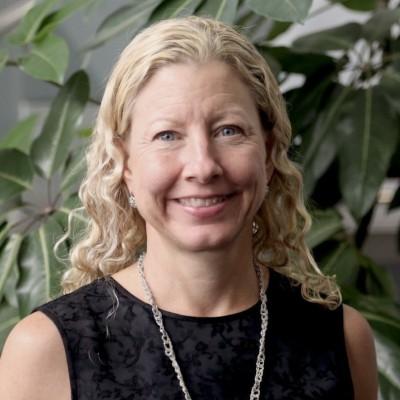
Grace Maguire
Biotech Executive
Q. What are you working on now that is intriguing/exciting/innovative?
A. I’m delving into new technologies such as AI to see how they’re changing the biopharmaceutical industry. I want to understand how they can enhance the work we do and what to watch out for – where the guardrails should be, where machine learning stops, and most importantly, when human oversight is needed. There is enormous potential to accelerate drug discovery and the development process, and we need to be mindful of what that means for patients. The AI experts are still figuring it out, but people are embracing technology and forging ahead in parallel so it’s important that we do so responsibly. For example, in drug discovery, how is the FDA evolving in terms of allowing researchers to harness the potential benefits of AI, while maintaining high standards for patient safety?
Q. Why did you decide to go into science?
A. I’ve always been fascinated by science and medicine and wanted to help patients; I believed in what medicine could do. Today people talk about aligning their personal purpose and mission with their career, and I was fortunate to have that from the very beginning. Back in college, my biology professor suggested I would be a good “detail man” – that’s what pharma reps were called historically – and that’s what I went into right after college. My role as an oncology sales representative in the NYC area was one of my favorites because I saw how patients benefitted from the fruits of pharma’s labor. This reinforced my commitment to the industry, and I knew that if I helped improve one person’s life, I was on the right path.
Q. What is most exciting about science for you?
A. The advances we are making in drug discovery – particularly in oncology and rare diseases. Years ago, women with HER2 positive breast cancer had very different outcomes than they do today. Now, if caught early, surgery, chemo, and HER2 targeted drugs can dramatically improve survival and most patients are essentially cured. But there’s so much more we can do, and we are entering a brave new world of research and development which can chip away at diseases that were previously incurable. For example, genetic screening of newborns for conditions such as Spinal Muscular Atrophy (SMA) can identify issues early and effective therapy can change the course of their lives. With the acceleration of science using technologies like AI, we will continue to find answers that can be deployed to deliver breakthrough drugs.
Q. What is one of the biggest professional challenges women face?
A. We tend to be perfectionists, and hesitate to embrace new challenges until we feel we’ve perfected what we’re already doing. While it’s important to strive for perfection, we need to balance that desire with the realization that it’s okay to make mistakes as we learn new skills and explore different areas. We have to take chances and calculated risks, and be confident in our ability to overcome obstacles as we move forward in our career and work to achieve our personal missions.
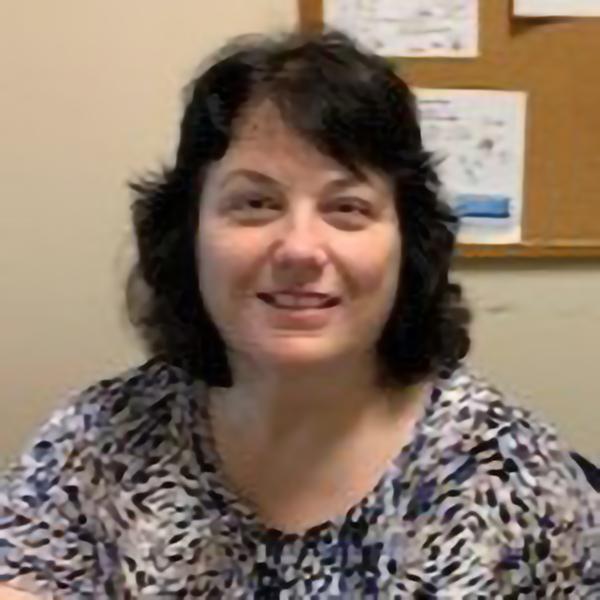
Doreen Osgood, MS, PhD
Clinical Assistant Professor, Cell and Molecular Biology, URI College of the Environment and Life Sciences RI Director & PI, Amgen Biotech Experience
Q. What are you working on now that is intriguing/exciting/innovative?
A. In addition to being a professor, I am also the Principal Investigator (PI) and Rhode Island Director of the Amgen Biotech Experience program (ABE). This is an innovative international science education program that introduces high school students to the excitement of scientific discovery. This program connects academic learning to the real-life biosciences. It allows students to see the “big picture” of what they do in the classroom to real world scientists. ABE provides teachers with the loan of research-grade equipment, supplies, curriculum, and professional development—all at no cost. My goal is to include as many RI high schools as possible, particularly those in diverse urban areas.
Q. Why did you decide to go into science?
A. When I was about 10, I asked for a microscope kit for Christmas. I was always fascinated with observing things I could not see. I think from this early age, I was always fascinated with microscopic discovery. Hence, I always wanted to be a researcher or work in a lab.
Q. What is most exciting about science for you?
A. I find it fascinating how advanced technology has come over time. I can remember when PCR (polymerase chain reaction) was developed to amplify DNA. Prior, there was the time-consuming process known as DNA cloning to produce many copies of DNA. (Wow, I am old!). We have come a long way since then. The polymerase chain reaction has been advanced in many ways and is now commonly used for a wide variety of applications.
Q. What is your dream for the future?
A. I hope for more inclusion and diversity in science. With each new scientific discovery, I hope the application will be available with equal access to all.
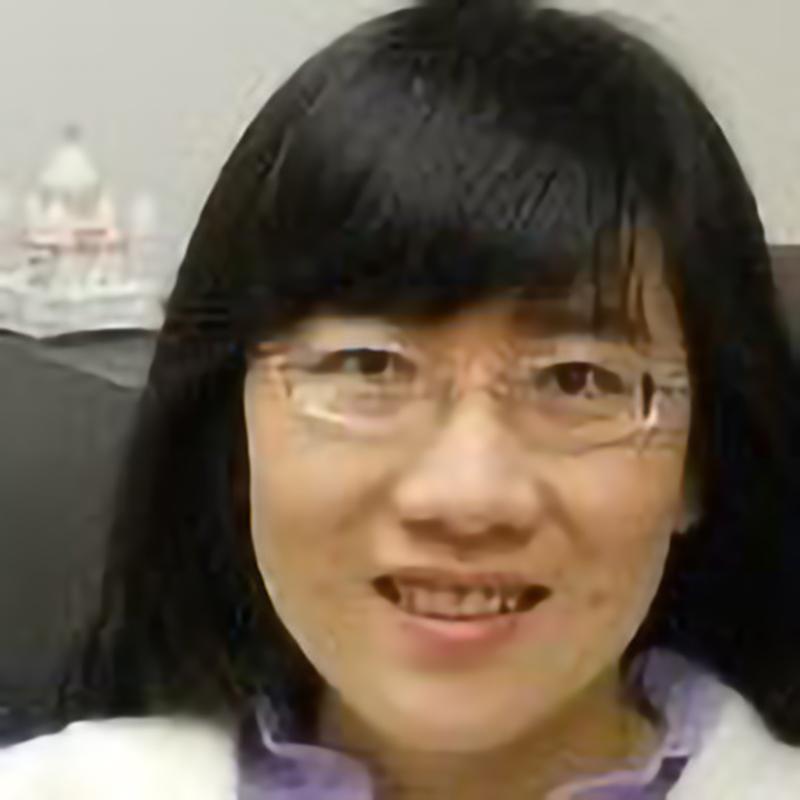
Nancy Lan Guo, PhD
Founder, Sostos LLC, Professor, West Virginia University
Q. What are you working on now that is intriguing/exciting/innovative?
A. I am using our cutting-edge AI technology to develop personalized cancer treatment selection methods. Eventually, individual cancer patients will receive treatment based on their unique genomic characteristics. A 7-gene lung cancer assay I invented for predicting tumor recurrence/metastasis and chemotherapeutic benefits has been validated in more than 1,600 patients including a randomized phase III clinical trial. The FDA classified it as “Novel Technology” in the pre-submission review. We are licensing my technology from my university. Once this is done, we will file for FDA market approval and commercialize it. We are also using our AI technology to discover new drugs or new indications of existing drugs.
Q. Why did you decide to go into science?
I am always curious and passionate about science. I want to see the real impact of my research in my lifetime, so I continued my journey as a researcher to founding a company for clinical applications of my inventions.
Q. What is most exciting about science for you?
A. I want to understand the human genome so we can better treat human diseases, especially cancer.
Q. What are you working on now that is intriguing/exciting/innovative?
A. Personalized vaccines. We’re starting with personalized cancer vaccines and moving on to personalizing any immunomodulatory therapy because, well, people are fundamentally, genetically different, and one size just does not fit all.
Q. Why did you decide to go into science?
A. Science invited me in. It invites everyone. If you are someone who asks “why” something happens, then, the door to perpetual exploration of natural phenomena just opens right up for you. I never decided to ‘go into science’, I just pursue one question after another and … realized one day that I had become a scientist.
Q. What is most exciting about science for you?
A. The potential to improve human and animal life through exploration of immune responses to the environment.
Q. What was your career journey like?
A. I chose to go to an all-women’s college because I wanted a space to grow without stress and tumult. Smith made me a feminist. Being a feminist got me interested in medicine. Becoming a physician made me understand the power of science to improve lives. Seeking answers to big questions like “how can we make more effective vaccines” drew me to research, the NIH, and working with brilliant and dedicated people at the NIH, Brown University as a faculty member, and eventually, stimulated my desire to found and run a company to explore the application of science to human health. That company is EpiVax. I am founder and CEO of the company and have been the chief scientific officer at EpiVax for 25 years.
Q. What has been your biggest professional challenge?
A. Engaging, challenging, and mentoring members of my company is the biggest challenge.
Q. What is your dream for the future?
A. To finally have created a vaccine that is given to people that works and is safer and more effective due to computational design.
Q. What advice would you give a young woman just entering the field?
A. Believe in yourself. Choose to pursue the more thrilling, challenging path, and you’ll be proud that you did so for the rest of your life. Embody fearlessness. And never forget that we are here because other women fought for us. Fight for equality for women in science, medicine, and the workplace.
Q. Why did you decide to go into science?
A: I decided to go into the science field because it always intrigued me as a kid. When I was younger, science always drew me in and I jumped at the opportunity to take any extra science courses I could. After my mother was diagnosed with breast cancer and underwent experimental drug testing that ultimately saved her life, I knew that drug and vaccine creation was the specialty I wanted to focus on. In high school, I took a biotechnology course and that solidified my love for the field.
Q. What is most exciting about science for you?
A: Science is always changing. We are always learning new discoveries, techniques and challenges that make it an ever-changing field. It’s also such a vast field that I find I am learning every single day which makes my days engaging and exciting.
Q. What is your dream for the future?
A: Professionally, I was able to hit my dream before the age of 30 in becoming an actual scientist. It was a feat that I was told I would never be able to achieve, so the fact I was able to overcome that negativity before the age of 30 was a testament to my hard work and dedication. Now I dream of climbing in a company and becoming known as the “go-to” person about anything related to the different aspects of my job. For the future of science, I dream that society finds the cures and treatments to our most devastating ailments. I also dream that eventually advanced education becomes accessible to all regardless of financial background so that more people can learn more about science and contribute to the ever-changing advancements and discoveries.
Q. What are you working on now that is intriguing/exciting/innovative?
A. My company, Eascra Biotech, is part of an innovative NASA program called the InSPA program (in space manufacturing). We are part of a select group of companies working with NASA, the ISS National Lab and a private space company called Axiom Space to create a vibrant and profitable space economy by leveraging the unique conditions of low Earth orbit to design and build new technologies that can benefit humanity on Earth.
Eascra Biotech is a nanomedicine company. We’ve developed a new type of nanomaterial that mimics DNA and can deliver mRNA, gene editing, and other new treatments to hard-to-reach parts of the human body. While we are working to develop our company here on earth, in parallel we’re using low gravity orbit to elevate the performance of our technology for faster commercialization.
The project requires us to collaborate with lots and lots of smart people from many different disciplines. We are learning lots of new things from our colleagues as we also teach them about our science. It’s exciting and very interesting, but it takes a lot of work. I am constantly grateful for this unique and once-in-a-lifetime opportunity to be a pioneer and work with such amazing people!
Q. What would your dream ideal scientific discovery be?
A. As a nanomedicine company, Eascra has ambitious objectives. Our Janus Base nanoparticles (JBNps) surpass the current market standard, Lipid Nanoparticles (LNPs) market standard in many ways. JBNps are temperature stable, less toxic, and able to penetrate hard to reach treatment sites. Although we are initially targeting arthritis, we believe JBNps are versatile and have numerous potential applications. Our aim is to create a whole line of highly effective medical treatments through our work in space that can relieve suffering for many. At Eascra we always keep those who are battling illness and disease at the forefront of our minds.
Q. What has been your biggest professional challenge & how did you overcome it?
A. When you work with so many smart people, it’s easy to struggle with imposter syndrome and self-doubt. My team is smart, capable, and opinionated because everyone is highly engaged and wants the project to succeed. This means the people I work with never hesitate to share their opinions – this is a team attribute I encourage but must actively manage.
Because of the differences in background, these opinions can sometimes contradict each other. As a leader and the company CEO, I often need to weigh all perspectives against our big picture objectives and the immediate project needs, then make the best decision I can given the data at hand so the team can move forward and meet our deadlines while also moving forward towards our big picture project objectives.
This means I must have confidence in myself to navigate things forward based on the best information available to me. I must accept I don’t know everything, nor do I have to be an expert in everything. I must accept and be at peace knowing that things may not work out perfectly, but they will be good enough to advance us until we have additional information that can help us tweak things along the way. And if we experience unexpected outcomes, my team is smart enough to come together and figure out a path forward.
To make this happen, I need to establish healthy ground rules amongst the team so they can express themselves professionally, even passionately, while always showing respect to the group. I must actively work to build team trust and help each team member express themselves fully regardless of their position or background. This requires an ongoing effort on my part to coach younger team members to speak up and to mentor more experienced team members to actively listen. This is a leader’s role and it never, ever ends. It’s an ever-evolving process that takes time, patience, and lots of emotional intelligence.
Q. Why did you decide to go into science?
A. I was the “why?” kid, still am. I wanted to know how it all worked, especially living things. I was very lucky that my parents never discouraged my curiosity. I was able to find great mentors, starting in high school, who helped me recognize my love of science and encouraged me to pursue it as a potential career. I did have a short semester of doubt in college but went right back to Biology as my major and the place I felt the most understood and encouraged. Again, the mentorship of the professors and my peers was super important in my development as a scientist. I am so glad they were there and that I listened to their council because I have had so much fun asking why for 30 years.
Q. What advice would you give a young woman just entering the field?
A. My best advice has always been to find a mentor or 3 and be a mentor to other women. There is plenty of room in STEM for all the talent. Don’t let anyone tell you, you can’t be a success in science! There are as many ways to get there as there are women who try. Even if your road is not conventional, even if your priorities change (and they will) find your tribe and ask for support, you will find it when you least expect it and from the most interesting places and voices.
Q. What was your career journey like?
A. I see my career as a bit of a tree with a few branches. The trunk has always been the biological sciences, but I have tried a few branches along the way. I started with wanting to teach biology at the high school level, which didn’t last long as I liked teaching but not discipline. My next branch was into the bench science arena as an aquatic toxicology technician and then a research assistant in a lab studying Drosophila as a model system for leukemia. At this point, like a lot of women, I took a 1-year break to have a child and be home. The transition back was not easy as science and technology are not slow-moving pursuits.
Upon returning to the workforce, I did find a position in which I spent the next 20 years as a Research Associate and lab manager studying Placental Development and the link to preterm birth. This position combined both bench science and teaching as we were affiliated with a university, and I taught Undergrad and Grad students all I knew about our specialty and any methods of study I had picked up over my career. I did have another child while I was working in this lab, but the leave was more generous, and I was able to keep my position and return to it.
Branching again into the immunology field and over to the west coast, I worked at a university as the biology specialist and lab manager in a large Chemistry lab studying carbon capture technologies and TLR agonists as vaccine adjuvants. After two years we headed back east and another branch change. I landed where I am at present as the Laboratory Manager at Epivax, Inc. doing more of the behind-the-scenes planning of experiments and workflow as well as keeping the folks working under me still asking why. It has been quite a trip so far.
From Benchtop to Business Development
Q. What is exciting about your job?
A. At EpiVax, and in many facets of the industry, we work to improve human health. It’s exciting to know that our innovative research and therapies have an impact on lives around the world, creating safer products and happier and healthier lives for patients.
Q. Why did you decide to go into science?
A. I got into science as a career because of the influence of a female high school teacher. She made science fun and encouraged curiosity. I stay in science as a career because I love to learn. Science is ever-evolving and in so many exciting ways. If you love to learn, science is a great opportunity to do it every day.
Q. What was your career journey like?
A. My career journey has been anything but expected. From benchtop to business development, I couldn’t have predicted where I would be now, and I couldn’t be happier. My advice to young women just entering the field is to know and embrace your values and explore every opportunity. Whether it be in different disciplines of science or different roles in the industry, follow your curiosity and, knowing your strengths, use them to guide you through your career journey.
Q. What are you working on now that is intriguing/exciting/innovative?
A. I work in enabling technologies for process development of small molecule pharmaceuticals. One of the most exciting things about what I have been working on is to see how the industry has adopted technologies such as continuous flow. Previously it was not an accepted or preferred way to make pharmaceuticals but as the science and knowledge has expanded and demonstrated that it can be used to synthesize molecules in a more efficient and safer way, there is now much broader utilization.
Q. What is most exciting about science for you?
A. Science has been a great career for me because it allows for seemingly endless creativity. Many of the other careers that I considered had a more regimented workflow and a known way to do the job, but science does not have a known solution and there are often many ways to solve a particular problem. This allows us to think outside the box and keeps every day new and exciting.
Q. What advice would you give a young woman just entering the field?
A. Some of the things that have been important and impactful in my career so far is first, spending time to understand what you want and need from your career or from your mentor. This can be very challenging to deconvolute from what other people want/need and what you need. Understanding this is the first step in being able to attain those in a job and therefore leads to good job satisfaction. Next, find good resources to help you advocate for yourself or others that can advocate for you. It is very important to break out of imposter syndrome and realize that you can bring a lot to the table, and finding good coworkers can be useful in this.
Q. What are you working on now that is intriguing/exciting/innovative?
A. “At EpiVax we are predicting immunogenicity with in-silico tools to support the development of safe and effective vaccines and therapeutics that meet patients’ needs. It is exciting, motivating and rewarding to be able to work with some of the brightest and most innovative minds in the field while ultimately having an impact on the lives of patients. I work in bioinformatics, or the application of computational tools and analysis to capture and interpret biological data. Specifically in my department, we are developing and using computer algorithms to study immunology and then apply the results to biologic therapeutics and vaccines.”
Q. What was your career journey like?
A. “It was not a straight line! When I began I would have never anticipated the turns this journey would take me. I attended the University of New Haven majoring in forensic science and wanted to work in a state crime lab. I added a second major in chemistry and then upon graduation I pursued a PhD in medicinal chemistry at the University of Rhode Island. I soon recognized that was not my path and made a difficult decision to leave the program and pursue a career path in the biopharma industry at Ipsen. I worked in the laboratory as a research associate in peptide chemistry and gained experience in the design and production of peptides supporting R&D programs from concept assessment to lead optimization in the endocrinology and oncology therapeutic space. During my seven years there, I completed a Master’s degree in pharmaceutical chemistry from the University of Florida. During that time, I got married and had two beautiful children. Layoffs due to the close of the peptide research program occurred during my maternity leave with my second child. My next role started ten months later at EpiVax as a bioinformatics project manager. Over the past five years at EpiVax, I have been able to pave a path I never would have expected when my career journey began and I have recently taken on the role of Director, Bioinformatics at EpiVax.”
Q. What advice would you give a young woman just entering the field?
A. “First, take chances and embrace the opportunities that you are given, even if they seem daunting. Think of every challenge as an opportunity to gain experience, even if you fail. Growth comes from the uncomfortable. Participate in discussions and ask questions. Believe that the people you are interacting with want to see you succeed – most likely they do! (And if they don’t, it’s better to think they do anyway!) Second, stay open-minded. The career trajectory you envision may not be the path you follow in the end. Pay attention to what excites you, to what makes you feel accomplished and to what you find rewarding. Figure out how to bring your authentic self into the role you were meant to play.”
Q. What are you working on now that is intriguing/exciting/innovative?
A. One particular project I’m really excited about is one that came to us as an “exploratory” chemistry project,where we were asked to synthesize a very challenging intermediate compound (chemical compounds widely used in manufacturing various types of drug in bulk quantity) which is very dangerous to handle. This gaseous fluoro-intermediate is a potent carcinogen, toxic, and explosive, but a highly useful building block in pharmaceuticals. After some initial failed attempts, we were able to find the best synthetic route to produce this compound safely through continuous flow manufacturing. We successfully took the project from gram-scale to multi-kilogram scale in our manufacturing facility!
Q. Why did you decide to go into science?
A. I entered the science field because one of my best friends and her sister both suffered from Cystic Fibrosis. I wanted to use my love for chemistry and engineering to be a part of the development of treatments targeted at life-threatening diseases. I was able to intern at Vertex Pharmaceuticals and witness first-hand how the tireless efforts of the scientists there led to the creation of the drug that has saved my friend’s life.
Q. What advice would you give a young woman just entering the field?
A. My advice would be to not underestimate yourself and your abilities. Upon entering the scientific community in industry, it is very easy to get overwhelmed and feel as though you don’t know as much as your peers. It took a while for me to realize that I learn at a different pace than others and that didn’t mean I wasn’t as intelligent as they are – it just meant that I had to understand what learning/working methods worked best for me. I was constantly comparing myself to others who had been in the field for a few years and feeling as though I wouldn’t be successful like they were. It became very discouraging in the moment, but I found that focusing on small goals that I set for myself helped me stay on target for growth in my career at my own pace. Setting my own expectations helped me stay motivated and confirmed that I am in the right career and climbing the ladder rapidly!
Q. Why did you decide to go into science?
A. “I decided to go into engineering as I was applying for college. I enjoyed, and was strong in, both math and science. My AP chemistry teacher had twin boys who were both earning their PhDs in chemical engineering and he encouraged me to pursue chemical engineering. Since I didn’t have a strong pull to any other engineering discipline, I thought it was a good discipline that offered many career options and different industries. That was helpful for me, to know I could still carve out the career path I wanted to take.”
Q. What was your career journey like?
A. “I took a different path into the life sciences. After earning my BSE in chemical engineering from the University of Michigan (Go Blue!) I decided to pursue my masters, mostly because I wanted to enter the Life Sciences but felt I needed more experience. My internships had all been in the semiconductor industry, so I didn’t have any experience at Life Science companies. I completed my master’s program in chemical engineering practice at MIT. Since then, my career has been all in the Life Sciences, first in biopharma, and then in medical devices. I spent a considerable amount of time at a medical device design and development company in a number of roles and landed on the Executive Leadership team overseeing engineers, designers, quality and manufacturing for medical technology clients. Two years ago, I leveraged my medical device development expertise and launched my own company, working as a medical device development consultant and a fractional COO/C-suite executive. I work with medical device start-ups who need someone to guide them through the medical development process and start-up landscape to bring their innovations to life. I’ve advised a number of start-ups through pitch deck review, navigating the funding landscape, selecting and working with design and development partners, and meeting the quality and regulatory expectations along the way. It’s very fulfilling to see the latest innovations and technologies and helping my clients reach success.”
Q. What advice would you give a young woman just entering the field?
A. “Pay attention to what you gravitate toward and what lights you up – in small and big ways. Those are clues to a career path and decisions that will lead you to the most fulfilling career for you. Also, learn and lean into your strengths. And by strengths, I’m not talking about areas of expertise, but your superpower strengths that show up in how you work, and that transcend any particular technical area or industry. It’s only been in the past couple of years that I’ve gotten to know my strengths and start to use them more in my leadership and career. It’s led me to feel supercharged and on fire when those strengths are fully engaged.”
Integrating biology, medicine & data science
Q. What are you working on now?
A. “I am currently working on developing diagnostic tests for neurodegenerative diseases. Finding therapeutics and developing effective drugs have dominated most of the work to date. There is yet to be a cure. My opinion is that in order to effectively treat neurodegenerative diseases, we must first accurately identify them because at a clinical level they all look the same. We need to understand the mechanisms that underlie different conditions and be able to differentiate between them. That way when we go to clinical trials, we use the right set of patients to test the drug under development, and they can be more effective because they are developed specifically for that type of disease. To help develop these tests, I am using state-of-the-art omics technologies and machine learning approaches. We are currently working on our first product, a molecular diagnostic test to predict shunt surgery outcomes in patients with Normal Pressure Hydrocephalus.”
Q. Why did you decide to go into science?
A. “I was always a question-asking child, fascinated by mysteries and investigative topics. Throughout my adolescence, I was an avid reader of Sherlock Holmes. I considered becoming a scientist or a forensics police investigator. In addition to my job as a research assistant in Austria, I was weighing two other alternatives at the time, one of which was an exam for admission to the police academy for forensic work in my native Italy, which I found to be quite intriguing. The other was an attractive PhD opportunity at University of California in San Diego where the Principle Investigator (PI) I would be working with was one of the best and well-known in the field at that time. Science is my passion and doing the PhD was a higher degree – I am an ambitious student at heart, so I took it.”
Q. What has been your biggest professional challenge & how did you overcome it?
A: “I was in academia doing very basic research and felt frustrated that my work wasn’t having a direct impact in improving people’s lives. I felt like I had to do more so I began to explore opportunities. I decided to get an MBA to acquire the skills that I needed in order to bring my research from a concept to a physical and functional product that would serve the patient community. As my expertise increased, I felt that in order to advance, I needed greater direct control over the entire process to ensure that things were going the way I desired and had dreamed they would. To overcome that challenge, I became an entrepreneur. I co-founded Adelle Diagnostics, and now I’m doing gestational research as well as trying to bring my product to market. I work with researchers and medical doctors as well as patients, which is a big responsibility because there is an expectation coming from them which makes me feel even more committed to the work.
“Interestingly, two years ago at Thanksgiving dinner I met someone who was just being treated for cancer. He was using the immunotherapeutic drug I had worked on about 10 years earlier as an academic. It was very emotional for me that despite what I thought during my academic years, I had contributed to the understanding of the mechanism of action of the types of drugs he was taking, that had finally received FDA approval and were a promise to many patients. When you see the direct positive impact of your research, it is fulfilling and an incentive to do more and better.”
Solving behavior change challenges to improve well-being
Q. What are you working on now that is intriguing/exciting/innovative?
A. “There are so many exciting things I’m starting to work on right now! One that comes to mind first is my work in the area of hereditary cancer syndromes. With genetic testing becoming more widely available, and the science of genetics making so many advances in the last decade, more and more people are becoming aware that they carry a genetic predisposition for different types of cancer. And this isn’t just BRCA. Researchers have identified over 50 Hereditary Cancer Syndromes (HCS) that are associated with germline mutations in specific genes. While knowledge of having a genetic mutation can be helpful in early detection, it can also be incredibly stressful and we are only just starting to realize the emotional impact such knowledge can have. Our team is working on developing a program to help increase the resilience of “Previvors,” individuals who know they have hereditary cancer syndrome but have not yet been diagnosed with cancer.”
Q. What is most exciting about science for you?
A. “I love the goal of always trying to advance beyond what is already known. The idea of lifelong learning is exciting! We can always improve on what we have already done. It’s like a treasure hunt, even when you find the first treasure, there’s always more to discover.”
Q. What has been your biggest professional challenge & how did you overcome it?
A: “I think imposter syndrome is one of the biggest challenges for many scientists, especially female scientists. Doubting your skills or knowledge can be debilitating at times. It’s important to find a way to put that aside and be confident in your training and your skills. Finding a good mentor for your career can really help! I’ve had several over the years and when you have a trusting relationship where you can share your fears, they can help you address any insecurities.”
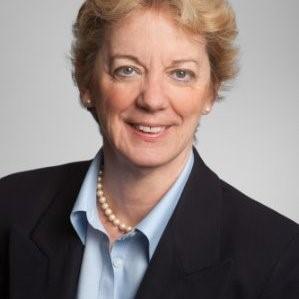
Barbara Rosengren
Biopharm Marketing & Project Management Consultant
Leading drug development efforts
Q. What is most exciting about science for you?
A. “I was not a scientist by training, I have a business background. But I worked in Project Management and Marketing for pharma companies, so I was very involved in the world of science, and the more I got involved, the more I found science really fascinating. When working for a startup biotech in Cambridge, I was so interested in how the scientists could just sketch a picture of a molecule on the whiteboard and explain how it would occupy receptors in certain ways and potentially provide benefit to patients. So for me it’s been a learned love of science. What attracted me to this industry was the ability to use science to solve intractable health problems for people. For example, at Novartis we had a product for treatment-resistant schizophrenic patients, and we were able to see that many of the patients who received it were able to leave the hospital where they had been living for quite some time. Just working on one such product in your career is a fantastic experience.”
Q. What was your career journey like?
A. “I spent my career in two fields within biopharma: one was in marketing, the other was the cross-disciplinary field of project management where we worked in cross-functional project teams bringing a product to market. I had a chance to interact across all disciplines, from people on the research bench, to marketing, regulatory, and technical development. I found that interaction to be really interesting because that’s where you learn how it all comes together and you learn the science as you go along.
“I joined Novartis U.S. straight out of getting my MBA at Wharton, then I had an opportunity to move overseas to work at headquarters in Basel, Switzerland. That was a fantastic opportunity both professionally and personally, having the experience of living and working in a foreign country for a couple years, I just learned so much. I came back to Novartis U.S. in project management. Later we moved up to New England and I joined Millennium, a medium-size biotech, which became part of Takeda. It was interesting to go from a very large international pharma to a medium-sized biotech. And it was exciting to live and work in Cambridge. After a few years I went to a small startup called Momenta Pharmaceuticals, working in project management and marketing. Now retired and consulting a little, I’m volunteering with Mass Challenge and Venture Mentoring Service (VMS) of Rhode Island.”
Q. What advice would you give a young woman just entering the field?
A. “One is to keep an open mind and keep your eyes open. On a scientific level, the pace of discovery is so exciting and it’s always accelerating. You might learn something that helps in your current project or it might give you an interest in a different area. Remain open to people in different parts of the company, you may have an opportunity to join a cross-functional team bringing a product to market. That’s where you get a deeper understanding and you learn more and more as you work across all areas. So if you have the opportunity to move out of a one-function area silo, consider taking it!”
Attention RI Bio Members!
Do you know a female RI Bio member who is leading the way in science? Perhaps you? Let us know and we’ll reach out to feature her here.

